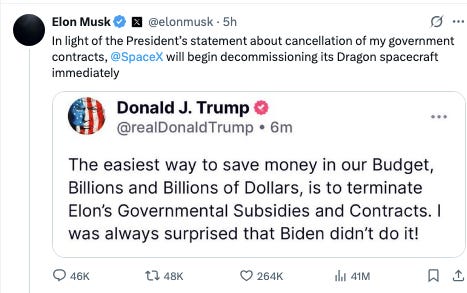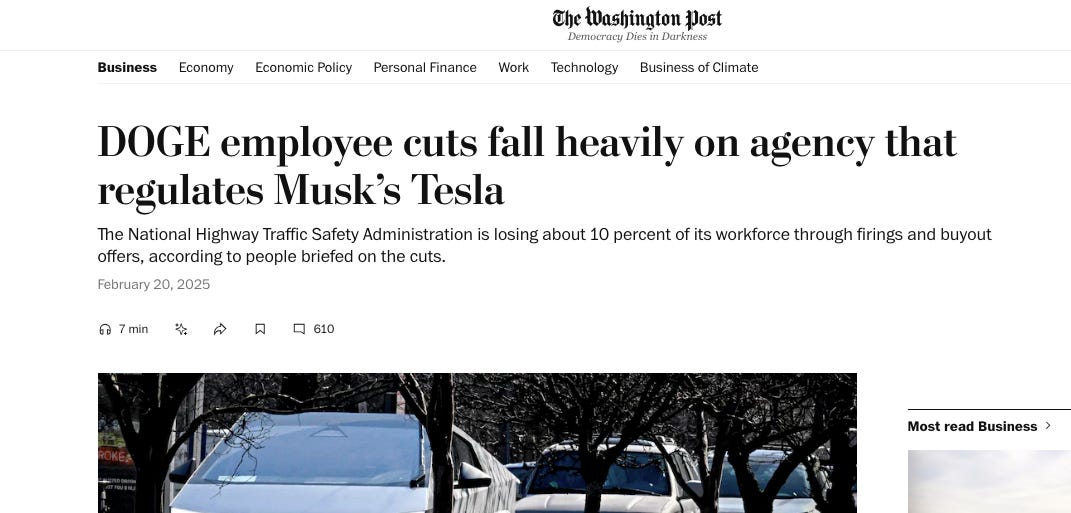By Matt Stoller, Substack (BIG), 6/6/25
Welcome to BIG, a newsletter on the politics of monopoly power. If you’d like to sign up to receive issues over email, you can do so here.
I had planned to write something on the possible Google remedy, but the political world is riveted by the bitter feud that has broken out between the richest man in the world, Elon Musk, and the President, Donald Trump. Though the fight feels a bit like pro-wrestling and may not last long, the insults back and forth are mean-spirited and bitter, and were accompanied with threats.
From a market power perspective, there is potential policy fallout, and that’s what interests me. Trump said he might cut Elon Musk’s government contracts, which are largely centered in his rocket company, SpaceX. That’s a big deal, because the company runs much of our space program. In the last quarter of 2023, SpaceX lifted up 90% of all pounds sent into orbit, which makes it a monopolist in launching satellites. It provides the only vehicle that astronauts have to get to and from the International Space Station.

There’s more. A big part of SpaceX is the communications satellite company Starlink, which has around two thirds of all satellites in space and has a dominant lead in its market, allowing people to get broadband internet with a small dish anywhere on the planet. Starlink is so important that it is a key geopolitical weapon. Musk has made the call to allow or disallow Ukraine from using Starlink terminals for different warfighting purposes, giving this individual sovereign-level powers.
After Trump threatened Musk today, Musk responded by saying he would use his power to jeopardize U.S. interests.

It’s not clear if he was joking, but even a joke threat makes the point. Decommissioning the Dragon spacecraft would harm the International Space Station and hinder U.S. encrypted communications, some of which flow over Musk’s network.
One result of this fight is that Steve Bannon, a close advisor to Trump, has suggested that Trump use the Defense Production Act – a legacy law from mid-century that allows the government to use civilian industrial capacity for national security purposes – to take over SpaceX. Here’s the clip.
Bannon is correct in his argument. Something like launch capacity to space, especially when it’s a monopoly, or a vital communications network like Starlink, are too important to be controlled by one guy. And it’s government funded anyway, having received $22 billion in direct Federal monies, and more every year, with immense public support in the form of permissions to launch and knowledge built on top of the public space program.
Bannon’s argument isn’t just about seizing private power. It’s true that SpaceX’s rockets that bring satellites into space are reusable and efficient, and his company has won because its technology is better than rivals such as Blue Origin and Boeing. But there’s also a real monopolization problem. Here’s the New York Times discussing the company’s tactics a year ago:
The new generation of space entrepreneurs trying to emulate Mr. Musk is sufficiently concerned about what they see as his anticompetitive tactics that some of them are now willing to take him on publicly.
Tim Ellis started Relativity Space after being inspired by Mr. Musk’s pursuit of a rocket that could carry humans to Mars. Then he heard from other industry executives that individuals with ties to SpaceX were trying to block his efforts to raise money for his own Mars project.
Jim Cantrell worked with Mr. Musk at the founding of SpaceX in 2002. When he started to build his own launch company, Phantom Space, two potential customers told his sales team they could not sign deals because SpaceX inserts provisions in its contracts to discourage customers from using rivals.
Peter Beck, an aerospace engineer from New Zealand, met in 2019 with Mr. Musk to talk about Mr. Beck’s own launch company, called Rocket Lab. Several months later, SpaceX moved to start carrying small payloads at a discounted price that Mr. Beck and other industry executives said was intended to undercut their chances of success.
“I don’t think this is an accidental monopoly,” Mr. Beck said in an interview about SpaceX and Mr. Musk. “These are business decisions that are being made.”
Rivals allege two main tactics for the launch part of the monopoly. First, SpaceX allegedly charges below cost in certain contexts to prevent competitors from getting into the market. Second, the company inserts “right of first refusal” provisions with customers, meaning that it has the right to match competitors if they make a better offer. Both of these are classic moves of an aspiring monopolist. There are likely others tactics of course, rumors that Starlink gets better pricing from SpaceX launches than other rival satellites, which is self-preferencing. And there’s the sabotaging of funding rounds, plus the need for large amounts of capital and regulatory barriers to entry.
So there is a legitimate reason that the government has to use the Defense Production Act to take over SpaceX, since Musk is threatening to sabotage vital interests over a political spat. Normally, I’d support Bannon’s argument, and also call for an antitrust investigation and action, as that should have happened long ago. But this is the Trump era, and there’s a reason that didn’t happen
Talking about key national infrastructure in the context of two enormously powerful men calling each other pedophiles on Twitter is extremely weird. We’re in an oligarchy, and nothing screams that as much as this fight. And I will make an observation about how miserable it must be to work in this administration in a political capacity, because keeping your job and/or advancing means expressing zeal for cults of personality that can change at any moment.
Musk’s politics are those of a standard Reagan libertarian – low corporate taxes, free trade with China, bad labor standards, lots of immigration – and he fits in well with the Republican establishment. But he’s both immensely wealthy, and he has a cult of personality almost as big as Trump. Before this fight, the cringe adoration for Musk among GOP officials was overwhelming. For instance, the FBI set up a task force to look at anti-Tesla vandalism, every agency investigating parts of Musk’s empire was dismantled, the FCC and Commerce Department redirected broadband subsidies to Starlink, and trade reps helped Musk’s broadband company get contracts in India, Somalia, the Democratic Republic of Congo, Bangladesh, Pakistan, Vietnam, and Lesotho, using the threat of tariffs as a lever. The State Department even tried to order $400 million of electric armored cars from Tesla, before being exposed and embarrassed.

I’m not making a corruption argument, though obviously the conflicts of interest here are insane. I’m making a slightly different point. For the last three years, and then increasingly since Trump took office, every Republican official with less than a billion dollar net worth has been bending over backwards to be as obsequious as possible to Musk. When told to jump they ask how high, they self-righteously attack and ferret out anyone who had anything to do with anything that might slightly annoy Musk. It’s little stuff, like this, which I’m guessing Musk didn’t ask for but some random Trump staffer thought might get him a promotion or a positive word from the boss.

Since they don’t know what they want in terms of a governing agenda, and they aren’t getting clear direction, Trump officials are just trying to please the most powerful cult of personality they see. They are acting out of fear, a constant sense of exhaustive social climbing.
And now, everything that these people have done, all the worshipping of DOGE and Musk, all the extra subsidies they’ve tried to slip Musk’s way, is that for nothing? Have the rules changed? Will they now be criticized for what they thought they were supposed to be doing?
That’s one of the problems with oligarchy. It really is arbitrary, and it sucks for everyone, not just those victimized by the vagaries, but even for those working for the oligarchs. That is one reason the rule of law matters and why institutional integrity is useful. Being at the utter whim of powerful men who can change their mind whenever, without consequence, well, it’s a terrible way to run a country. It took us a thousand years to develop democratic systems and get us away from this kind of arbitrary and capricious behavior. Hopefully we’ll start to remember what we have before we lose it.
In the meantime, yeah, we should treat SpaceX and Starlink like the public utilities they are. And if Trump really wanted to go after Musk, he’d send the Federal Trade Commission after SpaceX to look at some of its contracts and pricing choices. But we’re a ways from that, even if an enterprising state official might be able to do it.